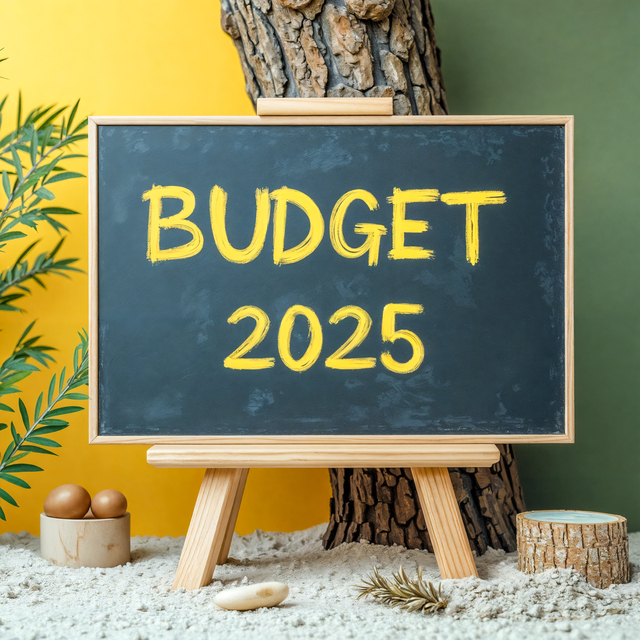 Dhiman Roy, CEO and Director, GreenH Electrolysis Pvt. Ltd. said, “An interesting budget focussed on accelerating growth, securing inclusive development and invigorating private sector investment. The support for clean tech manufacturing, which includes domestic manufacturing of electrolysers under the National Manufacturing Mission, to further “Make in India”, could be seen as a positive step for India in its energy transition efforts.
Dhiman Roy, CEO and Director, GreenH Electrolysis Pvt. Ltd. said, “An interesting budget focussed on accelerating growth, securing inclusive development and invigorating private sector investment. The support for clean tech manufacturing, which includes domestic manufacturing of electrolysers under the National Manufacturing Mission, to further “Make in India”, could be seen as a positive step for India in its energy transition efforts.
The easing of import duties on critical minerals not available in India is expected to boost the manufacturing sector and create new job opportunities for our youth. While the industry had hoped for subsidies and mandates for green hydrogen in blending & purchase obligation for some sectors which would have created demand, we remain confident in the value proposition of green hydrogen in India’s clean energy landscape and look forward to continued support from the Government.”
 Anand V S, Managing Director at NOCIL Limited said, “With the Union Budget 2025-26, the Indian government has reaffirmed its commitment to simplify and enhance the ease of doing business this is expected to have a positive impact on attracting investments. The emphasis on infrastructure development, with an allocation exceeding ₹11 lakh crore, will significantly enhance supply chain resilience and the growth of direct and indirect sectors.
Anand V S, Managing Director at NOCIL Limited said, “With the Union Budget 2025-26, the Indian government has reaffirmed its commitment to simplify and enhance the ease of doing business this is expected to have a positive impact on attracting investments. The emphasis on infrastructure development, with an allocation exceeding ₹11 lakh crore, will significantly enhance supply chain resilience and the growth of direct and indirect sectors.
A strong push on the demand side through the personal income tax changes in a fiscally responsible manner is expected to boost consumption and is expected to have a positive impact for rubber chemicals.
Support for the ‘Make in India’ initiative will empower domestic manufacturers to increase their market share and export potential, helping to position India as a global leader in chemicals. Overall, these measures are expected to drive growth in the sector and contribute positively to India’s economic goals.”
 Ashish Bhandari, MD and CEO, Thermax said, ““The Union Budget’s strong push towards manufacturing and the Make in India initiative reaffirms the nation’s commitment to becoming a global manufacturing powerhouse. The newly announced National Manufacturing Mission, with its comprehensive policy support and execution roadmap, will streamline the sector and drive exponential growth.
Ashish Bhandari, MD and CEO, Thermax said, ““The Union Budget’s strong push towards manufacturing and the Make in India initiative reaffirms the nation’s commitment to becoming a global manufacturing powerhouse. The newly announced National Manufacturing Mission, with its comprehensive policy support and execution roadmap, will streamline the sector and drive exponential growth.
Equally important is the focus on green and clean development – supporting clean tech manufacturing will be a game-changer in advancing energy efficiency and accelerating our journey towards sustainability. Additionally, strengthening workforce skills through global skilling partnerships will help bridge critical gaps and position India as a key player in the global supply chain. With these strategic initiatives, India is well on its way to achieving sustainable, inclusive, and technology-driven industrial growth.”
 S.K. Chaudhary, Chairman, Safex Chemicals said, “The Government has tabled a visionary document capturing the roadmap to pivot India’s role as an economic global superpower. We applaud the bold and strategic reforms that draw global attention to India’s coming of age in critical areas of food, critical resources, and energy security. The focus on improving ease of doing business through regulatory reforms and a state-specific index will enhance competitiveness and attract greater investment, both foreign and domestic, thus promising to reignite the capex cycle. The fiscal prudence demonstrated in setting FY26 fiscal deficit target at 4.4% reinforces India’s commitment to economic stability.
S.K. Chaudhary, Chairman, Safex Chemicals said, “The Government has tabled a visionary document capturing the roadmap to pivot India’s role as an economic global superpower. We applaud the bold and strategic reforms that draw global attention to India’s coming of age in critical areas of food, critical resources, and energy security. The focus on improving ease of doing business through regulatory reforms and a state-specific index will enhance competitiveness and attract greater investment, both foreign and domestic, thus promising to reignite the capex cycle. The fiscal prudence demonstrated in setting FY26 fiscal deficit target at 4.4% reinforces India’s commitment to economic stability.
The emphasis on increasing agricultural productivity, supporting farmers with enhanced credit, and promoting sustainable practices aligns well with the needs of the industry. The PM Dhan-Dhaanya Krishi Yojana’s focus on 100 low-productivity districts and Nafed-NCCF’s four-year pulse procurement plan signal a decisive push for agricultural resilience. The launch of a six-year programme for ‘Aatmanirbharta’ in pulses, along with initiatives to boost vegetable, fruit, and cotton production, will strengthen food security and farmer incomes.
On the industrial front, the National Manufacturing Mission, with dedicated policy and execution support, will accelerate India’s cleantech leadership. Enhanced investment and turnover limits for MSMEs, term loans of up to ₹20 crore for export-oriented enterprises, and a balanced approach to labor flexibility and worker rights will ensure inclusive growth. The commitment to skill development for future-oriented sectors will equip India’s workforce to drive the next phase of economic transformation, especially in niche sectors such as advanced Chemicals, CDMO, and APIs.
The government’s push towards self-reliance in pulses and edible oils under the ‘Mission for Aatmanirbharta in Pulses’ is a commendable step towards reducing dependency on imports and ensuring food security.”
 Ankur Aggarwal, Chairman – CropLife India and Managing Director of Crystal Crop Protection Ltd., shared, “The precise focus on enhancing productivity in the Union Budget 2025-26 is expected to foster significant growth in the agricultural sector, benefiting farmers and promoting sustainable farming practices. The Government’s well-defined vision to prevent migration from rural areas, coupled with the scheme that prioritizes women and youth, is a welcome and forward-thinking step. This initiative is set to drive greater adoption of modern technologies, including drones and precision agriculture, thereby providing a much-needed boost to innovation and efficiency in the sector.
Ankur Aggarwal, Chairman – CropLife India and Managing Director of Crystal Crop Protection Ltd., shared, “The precise focus on enhancing productivity in the Union Budget 2025-26 is expected to foster significant growth in the agricultural sector, benefiting farmers and promoting sustainable farming practices. The Government’s well-defined vision to prevent migration from rural areas, coupled with the scheme that prioritizes women and youth, is a welcome and forward-thinking step. This initiative is set to drive greater adoption of modern technologies, including drones and precision agriculture, thereby providing a much-needed boost to innovation and efficiency in the sector.
It is heartening to witness the inclusion of productivity and resilience in agriculture as one of the key priorities of the Union Budget 2025. The crop protection industry looks forward to partnering with both the Centre and State Governments to focus on the 100 districts with low productivity. Together, we aim to enhance agricultural output, improve sustainability, and support farmers in these regions through targeted interventions and innovative solutions”.
Balram Singh Yadav, Managing Director, Godrej Agrovet Limited said, “The budget proposals showcase a comprehensive strategy to strengthen India’s agricultural sector, positioning it as a key driver in our journey towards Viksit Bharat. By addressing critical growth levers such as high-yielding, climate-resilient seeds, boosting cotton productivity, and achieving self-sufficiency in pulses, the budget lays a robust foundation for a resilient agri-economy. The enhanced loan limit under the Modified Interest Subvention Scheme – from ₹3 lakh to ₹5 lakh – for Kisan Credit Card loans will provide vital financial support to small fisheries and dairy farmers, empowering them to scale operations. India’s position as the second-largest global producer of fish and aquaculture is further bolstered by the reduction in basic customs duty on a key input material for feed, strengthening competitiveness and sustainability in the sector. The budget’s strategic push for self-reliance in pulses and edible oils, coupled with the new integrated program for fruits and vegetables, ensures both nutritional security and agricultural sustainability. With targeted initiatives like crop diversification and sustainable marine sector development, these measures not only enhance productivity but also reinforce the central role of farmers in driving India’s growth story.”
 Mihir V Shah, Executive Director, Vipul Organics Limited said, “It is a fabulous budget with the focus on meeting the aspirations of the booming middle class. The Manufacturing Mission that the Hon’ble minister has set up will further the cause of Make in India and boost domestic manufacturing. Extending the Credit Guarantee Scheme for facilitating term loans for purchase of machinery and equipment without collateral or third party guarantee, to the MSMEs for up to ₹100 crore, is a welcome step and will ease the credit requirements of the sector. Structural reforms that focus on ease of doing business, especially with regards to time limit for Provisional assessments and TCS/TDS compliances are also a welcome step”.
Mihir V Shah, Executive Director, Vipul Organics Limited said, “It is a fabulous budget with the focus on meeting the aspirations of the booming middle class. The Manufacturing Mission that the Hon’ble minister has set up will further the cause of Make in India and boost domestic manufacturing. Extending the Credit Guarantee Scheme for facilitating term loans for purchase of machinery and equipment without collateral or third party guarantee, to the MSMEs for up to ₹100 crore, is a welcome step and will ease the credit requirements of the sector. Structural reforms that focus on ease of doing business, especially with regards to time limit for Provisional assessments and TCS/TDS compliances are also a welcome step”.
AK Tyagi, Founder, Chairman and Managing Director of Nuberg Engineering Ltd. Mentioned, ““I congratulate the government on a forward-looking Union Budget 2025-26 that prioritizes energy security and sustainability. The ambitious Nuclear Energy Mission (100 GW by 2047) and the 500 GW renewable energy goal by 2030 reinforce India’s green future. Increased incentives for green energy, MSME solarization, and domestic manufacturing will boost industries and job creation.
The budget’s emphasis on hydrogen as a clean fuel aligns with India’s energy strategy. Nuberg EPC, a leader in EPC services for hydrogen projects, will play a key role in scaling up green hydrogen production, industrial decarbonization, and ammonia-based solutions. Investment in infrastructure and emerging technologies will further accelerate the energy transition. With strong policies and financial backing, this budget sets the stage for India’s leadership in sustainable energy.”































